Duckling Care 101: Insights for All Keepers

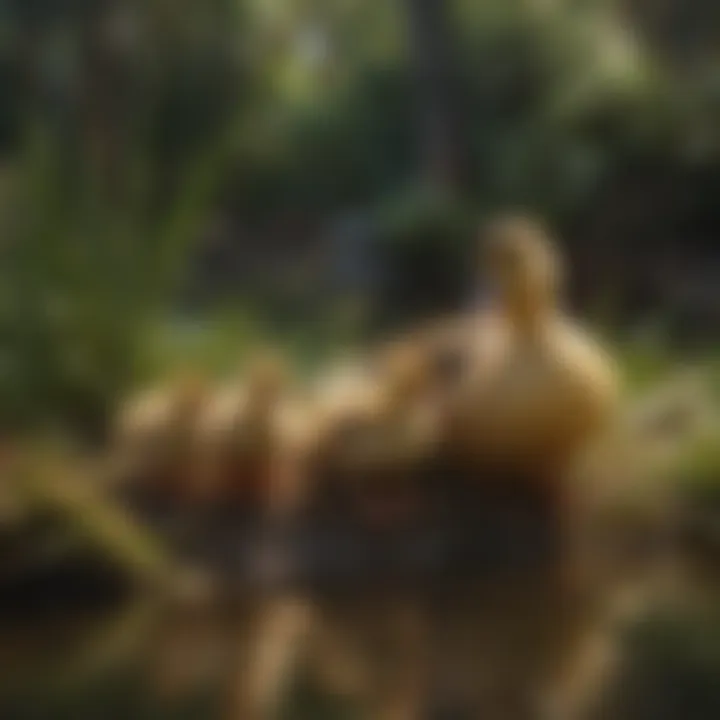
Intro
Caring for ducklings may appear straightforward, but become a keeper, and you realize the depth involved. These little beings rely on us not just for shelter and food, but also for love and attention. As you immerse in duckling care, you’ll discover it requires understanding their unique needs and providing an environment that fosters health and happiness.
Throughout this guide, we’ll explore a variety of critical aspects involved in raising ducklings. You’ll learn about essential habitat requirements, nutritional necessities, socialization strategies, and health management tips. For both the novice and seasoned duck keeper, this information aims to enhance your ability to nurture these delightful creatures, ensuring a rewarding experience for both you and your feathered friends.
Let’s get started with some crucial grooming techniques.
Intro to Duckling Care
Caring for ducklings can be a rewarding endeavor, yet it calls for knowledge and preparedness. Understanding the nuances of duckling care is crucial for both novice and seasoned keepers. These little bundles of fluff need proper environment, nutrition, and social interaction to not just survive, but truly thrive.
From the moment they hatch, ducklings exhibit a need for a nurturing surroundings to foster their well-being. One might liken this caring phase to teaching a child—everything from their social habits to their dietary needs can be influenced by the care they receive early on.
Why Ducklings Matter
Ducklings are not simply adorable; they're vital in many ecosystems and often serve as pets with distinct personalities. By becoming a responsible keeper, you're not only ensuring their health but contributing to the greater good of animal stewardship. The early stages of life are some of the most formative, making your role as a caretaker essential.
In this section, we will touch upon several important elements:
- Habitat Requirements: Creating a safe and welcoming living space is paramount. This includes selecting the right housing to protect them from predators and harsh weather conditions.
- Dietary Needs: Providing the right kind of food helps in their growth and development. Ducklings have specific nutritional needs that differ from adult ducks.
- Socialization Strategies: Ducklings are social creatures. Their experience with humans and other animals influences their behavior as adults.
"A good start is half the battle won."
By investing time and effort in the foundational aspects of duckling care, you lay the groundwork for healthy, well-adjusted adult ducks, who bring joy to your environment. Failing to address these elements could lead to a host of problems as they mature, ranging from health issues to behavioral problems.
In summary, this introduction sets the stage for an in-depth exploration of duckling care, emphasizing the critical aspects that must not be overlooked. The coming sections will further elucidate specific requirements and practices to ensure your ducklings grow into robust members of your household—or your homestead.
Understanding Ducklings: A Brief Overview
Understanding ducklings is essential for anyone who has ventured into the realm of poultry keeping. From their unique behaviors to their dietary requirements, getting acquainted with these charming little creatures lays the foundation for successful care. Ducklings are not just adorable balls of fluff; they come equipped with various needs that differ significantly from other species. So, it’s not just about having ducks; it’s about having the right information to nurture them properly.
Species Variability
When it comes to ducklings, variety is the spice of life. There are numerous breeds, each exhibiting distinct characteristics. For instance, Pekin ducklings are often noted for their rapid growth and tasty meat, while Muscovy ducklings take the cake for their unique plumage and quieter demeanor.
- Pekin: These ducklings present a friendly disposition and grow quickly, making them a popular choice for meat production.
- Muscovy: Their ability to fly and non-quacking nature set them apart, providing an interesting alternative for backyard flocks.
- Khaki Campbell: Known for their egg-laying capabilities, these ducklings are as productive as they are cute.
Each breed has its own set of requirements for care, housing and social interaction. Understanding which species you are caring for is crucial in providing them with the best possible environment. Bearing this in mind helps ensure you’re meeting their unique preferences while also potentially aiding in overall health and wellbeing.
Lifespan and Development Stages
Just like any living creature, ducklings go through several developmental stages, and being aware of these provides insight into their care needs.
- Hatchling Stage: This incredibly vulnerable time lasts for the first couple of weeks post-hatching. Ducklings need warmth, protection, and a constant supply of food and water.
- Juvenile Stage: Around 3 to 8 weeks. They begin to develop feathers and gain their footing. At this point, they can start foraging a bit more and might enjoy short outdoor explorations under supervision.
- Adolescent Stage: After about 8 weeks, ducklings begin exhibiting more social behaviors and their personalities start to shine. They can adapt better to a larger flock but still require close management.
- Adult Stage: Typically reached around 5-6 months, their lifespan can go beyond ten years. During this stage, these ducks require a suitable diet for maintenance and reproduction, along with health checks to catch any potential issues.
Understanding these stages assists caretakers in providing tailored care appropriate for each period. Whether you're dealing with the fragility of a hatchling or the robust nature of an adult, being in tune with their growth can lead to better outcomes.
"Caring for ducklings is a journey, not a sprint. Knowing when to nurture and when to let them explore will shape their future."
In summary, grasping the intricacies of duckling care can make all the difference. With different breeds and stages to consider, a deeper understanding ensures that each little quacker thrives in its environment.
Creating the Optimal Living Environment
Creating a comfortable and safe living environment for ducklings is crucial for their development and overall well-being. A well-structured habitat not only encourages natural behaviors but also helps in preventing health issues. By focusing on housing, temperature, and cleanliness, caretakers set the stage for a nurturing space where these young birds can thrive.

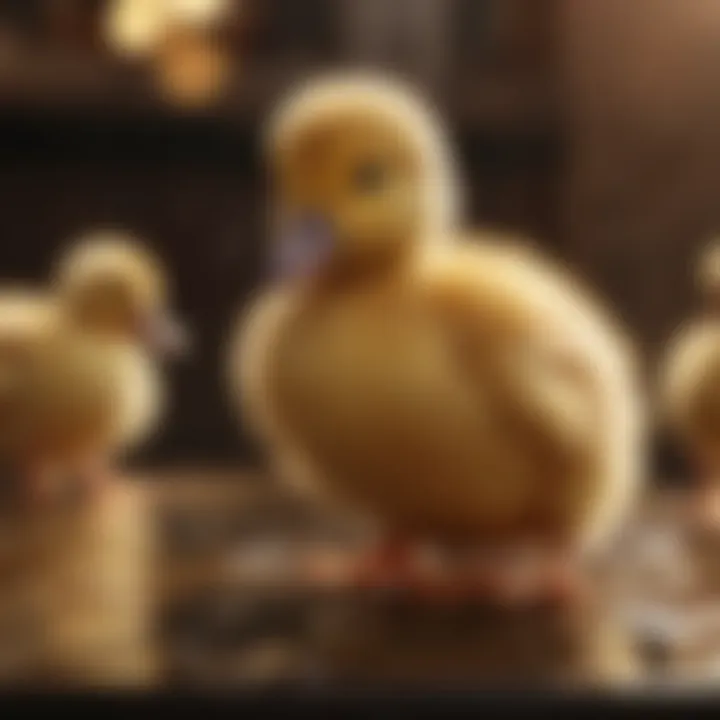
Selecting the Right Housing
When choosing the right housing for ducklings, it's imperative to consider safety, size, and space for movement. Ducklings grow fairly quickly, often requiring more room than one might initially assume. A suitable shelter could be a large coop or an old shed that has been refurbished. Materials like plywood or even repurposed wooden pallets can work well; after all, it's about function over looks.
- Ventilation: Proper airflow is essential to prevent moisture buildup and maintain air quality.
- Protection from Predators: Ensure that the housing is secure from raccoons, foxes, and even birds of prey. Simple locks on doors and sturdy, predator-proof wire can make all the difference.
- Easy Access: Your setup should allow easy access to the ducklings for feeding and health checks, but also ensure that they can't escape easily.
A little thoughtfulness around housing will go a long way.
Temperature and Heating Needs
Ducklings are quite sensitive to temperature, especially during their early days. A warm environment promotes healthy growth, while too much cold can lead to stress or illness. During the first couple of weeks, aim for a temperature of around 90°F (32°C). This can be adjusted downwards by 5°F (2.7°C) each week until they are fully feathered, typically around six weeks old.
Heating lamps are commonly used to maintain this warmth. When using them, here are a few considerations:
- Placement Matters: Position the lamp at one end of their enclosure, offering the ducklings a choice between warmth and cooler areas to avoid overheating.
- Safety First: Always check that lamps are securely hung to prevent accidents. Using heat lamps can pose fire risks if not dealt with cautiously.
- Monitoring: Use a thermometer placed at duckling level to ensure the temperature is just right. If they huddle close to the heat source, they're likely too cold. If they spread out far from the heat, it's time to lower the heating.
Bedding Options and Hygiene Maintenance
A clean, dry bedding area is vital for ducklings. Not only does it provide comfort, but it also prevents illnesses related to dampness. Several types of bedding are suitable, with some popular choices including:
- Straw: Natural and absorbent, straw is easy to clean and keeps the space dry.
- Wood Shavings: These are lightweight and also effective at absorbing moisture. However, avoid cedar shavings as they can be harmful.
- Paper Products: Recycled paper products can be an eco-friendly alternative, but they may require more frequent changing due to faster degradation.
Maintaining hygiene is equally crucial. Regular cleaning routines should be established, which includes:
- Daily Spot Checks: Remove wet bedding or any debris daily to keep the space tidy.
- Weekly Deep Cleans: Remove all bedding and clean surfaces with mild detergent. Ensure everything is thoroughly rinsed and dried before replacing bedding.
- Parasite Inspection: Routinely check for signs of mites or other pests that may affect health.
"Proper hygiene isn’t just about cleanliness; it’s about ensuring a healthy and happy life for your ducklings."
By creating the right living environment, focusing on appropriate housing, temperature control, and maintaining hygiene, ducklings start their lives on the right foot—or should we say, web? These steps not only facilitate their well-being but also enhance the relationship between caretakers and their feathered companions.
Nutritional Requirements for Ducklings
Caring for ducklings is not just about providing shelter; a significant part of their well-being revolves around what they eat. Proper nutrition is crucial in these early stages of life as it influences their growth, development, and overall health. Just like a well-oiled machine, each part needs to function in harmony to achieve peak performance. When it comes to ducklings, a balanced diet lays the groundwork for vibrant feathers, strong bones, and a lively personality.
Choosing the Right Feed
Ducklings have specific dietary needs that differ from adult ducks. For starters, look for a commercial waterfowl feed instead of generic poultry feed. The specially formulated feeds, often called grower or starter feed, are enriched with the right amounts of protein and essential nutrients. They usually contain around 18-20% protein which is ideal for young birds.
In addition, these feeds are fortified with vitamins and minerals which assist in healthy growth. When shopping, it’s a good idea to check the label for essential ingredients such as:
- Niacin: This vitamin is crucial for preventing leg problems and ensuring normal growth.
- Calcium: Supports the development of strong bones and a healthy skeletal system.
- Essential amino acids: These are the building blocks of proteins, vital for muscle development.
It's also wise to avoid any feed that contains low-quality fillers or by-products. Quality feed can make a world of difference in your ducklings' growth and vitality.
Supplementing with Fresh Foods
While commercial feed forms the backbone of their diet, fresh foods can sprinkle in additional benefits. Ducklings can enjoy a variety of vegetables, fruits, and grains, which not only enhance their diet but also keeps it interesting. Here’s a list of safe options to consider:
- Leafy greens: Such as kale or spinach, chopped into small pieces.
- Vegetables: Peas and zucchini are generally well-accepted and nutritious.
- Fruits: Slices of strawberries or melon can be a delightful treat.
- Grains: Whole grains like oats or barley may also be included in small amounts.
Always introduce new foods gradually and monitor for any signs of digestive upset. Remember that fresh foods should only supplement their main feed and not replace it.
Water Accessibility and Management
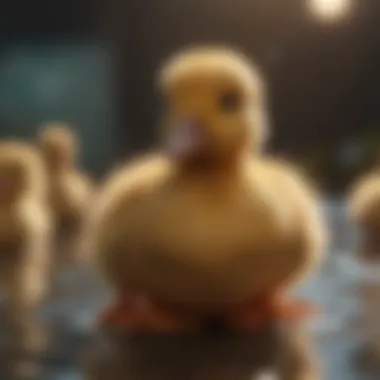
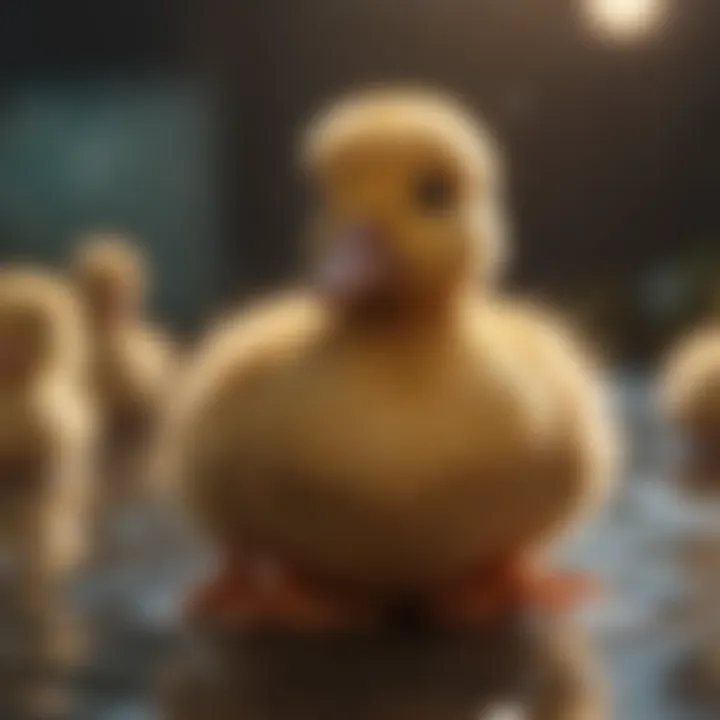
Water is essential for ducklings, not just for drinking but also for maintaining their well-being. Unlike some pets, ducklings don’t simply sip water; they generally prefer to dunk their heads in it too. This characteristic makes water management crucial.
Make sure to provide a shallow dish for water, as it allows them to wade and play without the risk of drowning. Ideally, this water source should be changed daily to keep it clean and free from contaminants.
In addition, ensure that the water is accessible at all times, but be cautious about the depth. If the container is too deep, very young ducklings may accidentally find themselves in over their heads.
Keeping their water clean and directly available leads to better digestion, hydration, and overall health. Ducklings will often bathe and drink simultaneously, which is entirely a part of their natural behavior. A little splash goes a long way in keeping them happy and healthy.
"Proper nutrition is not just about sustenance; it is the foundation of a thriving, energetic duckling. Good food and clean water go hand in hand in nurturing these wonderful creatures."
In summary, providing the right amount and type of feed, incorporating fresh supplements, and ensuring adequate water access is essential for a healthy upbringing of ducklings. By being vigilant about their nutritional needs, you shape their journey toward becoming robust, lively adult ducks.
Health and Care Practices
Taking care of ducklings goes well beyond merely providing food and shelter. Health and care practices are pivotal in ensuring these little creatures grow up strong and vibrant. The importance of implementing a systematic approach to health care cannot be overstated; it plays a significant role in their overall welfare. Introducing ducklings to a sound health routine from an early age not only prevents sickness but also nurtures a positive environment that promotes growth and general well-being.
For every duckling keeper, understanding how to recognize symptoms of illness, when to administer vaccinations, and the basics of grooming can mean the difference between a thriving flock and one plagued by health problems.
Regular Health Checks and Symptoms of Illness
Regular health checks are paramount for any duckling owner. Keeping an eye on each duckling allows one to spot issues before they escalate. It's suggested to conduct health inspections once a week, paying close attention to a few key elements:
- General Appearance: Look for signs of lethargy, ruffled feathers, or anything out of the ordinary. Ducklings should generally appear bright-eyed and alert.
- Behavioral Observations: Are they playing and interacting normally? Changes in behavior, such as isolation from the group, can signal potential health concerns.
- Physical Signs: Check for nasal discharge, watery eyes, and any unusual swelling.
- Body Condition: Ensure that the bones and body weight appear normal and that they are not excessively thin.
If you notice symptoms like these, they could indicate health problems that must be addressed promptly. The quicker one addresses issues, the better the chances of recovery.
"Prevention is better than cure."
Keep a checklist handy as you perform these health checks. This not only helps in tracking health developments over time but also aids in identifying recurring issues that may need a different approach.
Vaccination and Preventive Care
Vaccination is another cornerstone of duckling health management. Just like any other animals, ducklings are susceptible to diseases that can ravage flocks if not managed proactively. Introducing a vaccination schedule can prevent diseases such as avian influenza and duck viral enteritis.
You’ll find it beneficial to consult with a veterinarian about establishing a vaccination timeline that suits your specific context. In most cases, the first vaccination is administered when the ducklings are about 4 to 6 weeks old. Here’s a brief rundown of key vaccinations:
- Doxycycline: Helps prevent respiratory infections.
- Coccidiostat: Essential in tackling coccidiosis, a deadly intestinal parasite.
- Infectious Bursal Disease vaccine: Protects against another virulent illness that targets young birds.
In combination with vaccination, maintaining a clean environment plays a massive role in preventive care; ensure that the ducklings’ living space is free from waste and contamination to minimize exposure to pathogens.
Grooming and Feather Care
The grooming of ducklings is often sidelined, yet it is a crucial element of their care routine. Keeping their feathers clean is not just for aesthetics; dirty feathers can lead to various issues, such as problems associated with temperature regulation and overall health.
- Feather Inspection: Make it a habit to frequently check their feathers for dirt or signs of parasites. Early intervention, if issues arise, can save you a lot of trouble in the long run.
- Bathing: Introducing your ducklings to shallow water helps them learn to groom themselves naturally. While they're naturally inclined to preen and fluff, providing them with an opportunity to bathe is invaluable.
- Nail Trimming: As they grow, their nails will require occasional trimming to prevent overgrowth and ensure comfortable movement.
Finding the right balance between health checks, vaccination, and grooming creates the framework for a healthy duckling. Each aspect supports the others in ensuring the ducks thrive and live happy lives. Remember, a well-cared-for duckling is not only good for its health but also makes for a more enjoyable companionship!
Socialization and Behavioral Training
Socialization and behavioral training are vital components in raising healthy, well-adjusted ducklings. Ducklings, like many animals, are highly influenced by their early interactions. They need a range of experiences and stimuli to develop into confident and social adults. The importance of socialization cannot be understated as it sets the groundwork for their behavior and compatibility with humans and other animals later in life. Moreover, socializing ducklings can positively influence their mental well-being, reducing stress and anxiety.
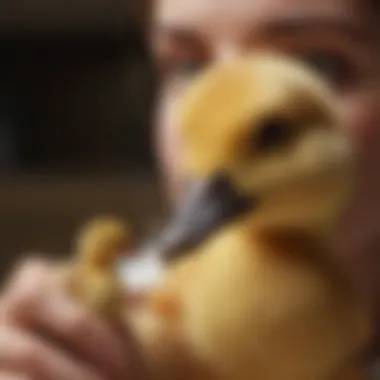
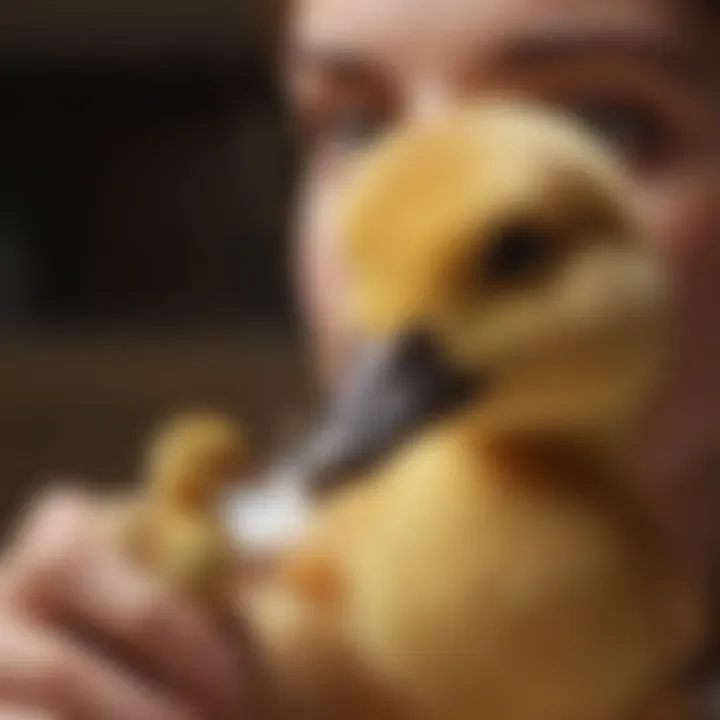
Being social creatures, ducklings thrive on interaction. As young as they are, the impressions they form during their critical development stages can steer their temperament. Engaging with them early on — through gentle handling and exposure to various sounds and sights — helps them grow more adaptable and less fearful. These experiences not only foster a strong bond between the ducklings and their keepers but also contribute to healthier and happier ducks.
Importance of Social Interaction
The value of social interaction goes beyond just keeping a duckling entertained. Here are a few key reasons why social interaction is essential:
- Building Trust: Regular handling encourages ducklings to become accustomed to human presence. This trust is crucial if they are to be kept as pets or raised in manageable environments.
- Mitigating Aggression: Social stimulation helps reduce aggressive behaviors that can occur as ducklings mature. When they learn to communicate and interact positively with their peers, they are less likely to exhibit hostility among themselves or towards their caregivers.
- Mental Stimulation: Providing diverse experiences keeps ducklings mentally active, preventing boredom and associated behavioral problems. Engaging them through play or challenges like obstacle courses can be very beneficial.
- Learning Communication: Just as humans learn from one another, ducklings pick up social cues from their interactions. They understand vocalizations, body language, and even hierarchy within group settings.
The process of socialization doesn't always unfold without a hitch. It's crucial to be patient, as each duckling has its own pace and comfort zone. Taking time to reinforce positive behaviors through rewards can enhance their learning experience and make the process enjoyable.
Introducing Ducklings to Other Pets
Integrating ducklings into a home with other pets can be both rewarding and challenging. The key to a smooth introduction is to approach it gradually and thoughtfully. Here are some important considerations:
- Assess Compatibility: Not all pets instinctively get along with each other. For example, dogs may see ducklings as prey, while cats might be curious but could also pose a risk. Assessing the temperament and behavior of existing pets before introducing them is crucial.
- Supervised Introductions: When the time comes to introduce ducklings to other pets, supervision is non-negotiable. Start with short, controlled interactions to gauge reactions. Always remain watchful; ducks can be delicate, and misunderstandings can arise quickly.
- Creating Safe Spaces: Set up an area where the ducklings can retreat if they feel threatened. This could be a small enclosure where they can observe other pets safely without feeling cornered.
- Positive Reinforcement: Rewarding both ducklings and other pets when they display calm and friendly behavior towards each other fosters a positive environment. Offering treats can turn initial apprehensions into trust-building experiences.
"Patience and consistent exposure can bridge the gap between ducklings and other pets, leading to harmonious coexistence."
Common Challenges and Solutions in Duckling Care
Caring for ducklings presents an array of challenges that, if not addressed properly, can lead to problems down the line. Understanding these challenges not only equips duckling keepers with the knowledge to manage their care effectively but also enhances the experience of nurturing these charming animals. Each challenge is unique, and solutions may vary, but knowing common pitfalls means better outcomes for both the ducklings and their owners.
Dealing with Aggression and Pecking Order
Aggression among ducklings, whether toward their siblings or humans, can be perplexing. Young ducks are instinctively social, which means establishing a pecking order is part of their development. However, this behavior can sometimes escalate into bullying, causing stress and injury.
It’s crucial to observe how your ducklings interact; look out for signs of aggression such as loud quacking, chasing, and pecking. You can mitigate this behavior by ensuring that each duckling has enough personal space. Overcrowding can lead to heightened tension. Additionally, distractions such as toys or a varied environment can significantly reduce aggressive tendencies.
When first introducing new ducklings into an existing flock, do so gradually. This can minimize disputes and allow the newcomers to integrate smoothly. If aggression persists, a temporary separation followed by reintroduction can help reset dynamics. Remember, understanding their social structure is key to fostering harmony among your feathered friends.
Addressing Dietary Deficiencies
Diet is a fundamental aspect of duckling care, and deficiencies can creep in unexpectedly. Without proper nutrients, you may notice stunted growth, weakness, or even behavioral issues. The cornerstone of their diet should be formulated feed designed specifically for ducklings. It’s critical this feed is rich in protein and formulated for their growth stages.
However, even with a good quality feed, there’s more to the picture. A varied diet can help prevent deficiencies. Adding fresh greens like kale or dandelion leaves can boost their intake of vitamins, while insects or mealworms provide essential protein. Ensuring that your ducklings have enough access to clean water is also paramount, as hydration plays a crucial role in nutrient absorption.
To spot dietary issues, watch for changes in behavior or appearances; for example, dull feathers or lethargy can indicate that something’s amiss. Incorporating regular vet visits as part of your care routine can be a safety net, as they can provide specific dietary recommendations and assess overall health.
"A little planning goes a long way—monitoring your ducklings closely can help you catch issues before they become serious problems."
Culmination: Nurturing Ducklings for a Brighter Future
As we wrap up our comprehensive guide on duckling care, it's essential to reflect on the significant role caretakers play in these young birds' lives. Understanding duckling care is not merely about meeting their basic needs; it's about fostering an environment that encourages growth, health, and social interaction. The choices you make today impact not just the well-being of your ducklings but also their future as mature ducks.
The Importance of Proper Care
Every detail in duckling care has ripple effects on their development. When you provide a clean, safe living space, nourishing food, and enough social interaction, you're not just ticking boxes—you're building a foundation for their future lives. Ducklings grow quickly, and their formative weeks are crucial for developing traits that will follow them into adulthood, such as temperament and social skills.
"The quality of care provided in these early stages significantly influences their character and longevity."
Benefits for Both Ducklings and Keepers
From a caretaker's perspective, nurturing these unique creatures can be a rewarding experience. The bond formed through daily interactions not only enriches the lives of the ducks but also those of their human companions. Some of the notable benefits include:
- Emotional Connection: Caring for ducklings can lead to strong emotional bonds. These birds can be affectionate and may develop unique personalities.
- Educational Growth: The process of understanding duckling needs and behaviors can enhance one’s knowledge about animal husbandry.
- Joy of Observation: Watching ducklings grow and develop their quirky behaviors is genuinely delightful and can bring joy to your daily routine.
Final Considerations
As you embark on this adventure, keep in mind the insights shared throughout this guide. They serve as a roadmap to help you navigate the complexities of duckling care and create an environment that fosters their health and happiness. The love and attention you provide can transform your ducklings into well-rounded adults that bring joy to you and your family for years to come.







